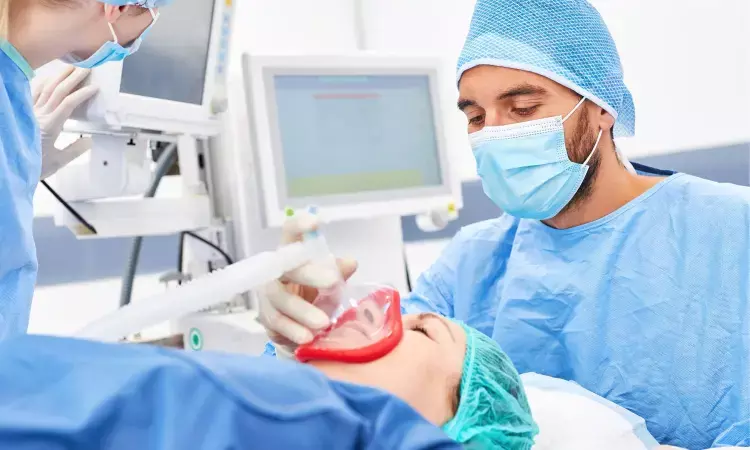- Home
- Medical news & Guidelines
- Anesthesiology
- Cardiology and CTVS
- Critical Care
- Dentistry
- Dermatology
- Diabetes and Endocrinology
- ENT
- Gastroenterology
- Medicine
- Nephrology
- Neurology
- Obstretics-Gynaecology
- Oncology
- Ophthalmology
- Orthopaedics
- Pediatrics-Neonatology
- Psychiatry
- Pulmonology
- Radiology
- Surgery
- Urology
- Laboratory Medicine
- Diet
- Nursing
- Paramedical
- Physiotherapy
- Health news
- Fact Check
- Bone Health Fact Check
- Brain Health Fact Check
- Cancer Related Fact Check
- Child Care Fact Check
- Dental and oral health fact check
- Diabetes and metabolic health fact check
- Diet and Nutrition Fact Check
- Eye and ENT Care Fact Check
- Fitness fact check
- Gut health fact check
- Heart health fact check
- Kidney health fact check
- Medical education fact check
- Men's health fact check
- Respiratory fact check
- Skin and hair care fact check
- Vaccine and Immunization fact check
- Women's health fact check
- AYUSH
- State News
- Andaman and Nicobar Islands
- Andhra Pradesh
- Arunachal Pradesh
- Assam
- Bihar
- Chandigarh
- Chattisgarh
- Dadra and Nagar Haveli
- Daman and Diu
- Delhi
- Goa
- Gujarat
- Haryana
- Himachal Pradesh
- Jammu & Kashmir
- Jharkhand
- Karnataka
- Kerala
- Ladakh
- Lakshadweep
- Madhya Pradesh
- Maharashtra
- Manipur
- Meghalaya
- Mizoram
- Nagaland
- Odisha
- Puducherry
- Punjab
- Rajasthan
- Sikkim
- Tamil Nadu
- Telangana
- Tripura
- Uttar Pradesh
- Uttrakhand
- West Bengal
- Medical Education
- Industry
Ephedrine effective for correction of hypotension during GA, even in elderly patients

Hypotension is a common complication during general anesthesia associated with increased postoperative mortality and morbidity. Every episode of intraoperative hypotension, regardless of duration, is linked to the risk of acute kidney injury and cardiovascular events. The vulnerability to hemodynamic disturbances increases with age, underscoring the need for prompt interventions for elderly patients who experience hypotension during anaesthesia.
Using ephedrine resulted in a notable rise in mean arterial pressure (MAP) and cardiac output (CO). Still, no meaningful correlation with age was detected in patients aged 45 years or older. These results imply that ephedrine is reliable for managing low blood pressure during general anaesthesia, even in elderly patients, says Yuta Uemura in a recent study published in BMC Anesthesiology.
Ephedrine is a mixed α- and β-agonist vasopressor for correcting hypotension during general anaesthesia. β-responsiveness decreases with age; therefore, this study aimed to determine whether ageing would reduce the pressor effect of ephedrine on hypotension during general anaesthesia.
Seventy-five patients aged 45 years or older were included in this study, with 25 patients in the three age groups: 45-64 years, 65-74 years, and 75 years or older. All patients received propofol, remifentanil, and rocuronium for general anaesthesia induction, followed by desflurane and remifentanil. Cardiac output (CO) was measured using esCCO technology. Ephedrine (0.1 mg/kg) was administered to correct hypotension. The primary and secondary outcome measures were changes in mean arterial pressure (MAP) and CO at 5 minutes after ephedrine administration.
The administration of ephedrine caused a significant increase in both MAP with a mean difference of 8.34 and CO (mean difference of 7.43) across all groups. However, analysis of variance revealed that the degree of elevation of MAP and CO did not differ significantly among the groups. Similarly, Spearman’s rank correlation and multiple regression analysis revealed no significant relation between age and the changes in MAP or CO after administering ephedrine.
They said ephedrine administration increased MAP and CO; however, no significant correlation with age was observed in patients aged > 45 years.
Ephedrine is effective for correcting hypotension during general anaesthesia, even in elderly patients.
Further reading:
https://bmcanesthesiol.biomedcentral.com/articles/10.1186/s12871-023-02244-4
BDS, MDS in Periodontics and Implantology
Dr. Aditi Yadav is a BDS, MDS in Periodontics and Implantology. She has a clinical experience of 5 years as a laser dental surgeon. She also has a Diploma in clinical research and pharmacovigilance and is a Certified data scientist. She is currently working as a content developer in e-health services. Dr. Yadav has a keen interest in Medical Journalism and is actively involved in Medical Research writing.
Dr Kamal Kant Kohli-MBBS, DTCD- a chest specialist with more than 30 years of practice and a flair for writing clinical articles, Dr Kamal Kant Kohli joined Medical Dialogues as a Chief Editor of Medical News. Besides writing articles, as an editor, he proofreads and verifies all the medical content published on Medical Dialogues including those coming from journals, studies,medical conferences,guidelines etc. Email: drkohli@medicaldialogues.in. Contact no. 011-43720751


